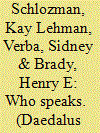| Srl | Item |
| 1 |
ID:
108869


|
|
|
|
|
| Publication |
2011.
|
| Summary/Abstract |
Using an August 2008 representative survey of Americans conducted by the Pew Internet & American Life Project, we investigate the consequences of Internet-based political activity for long-standing patterns of participatory inequality. There is little evidence of change in the extent to which political participation is stratified by socioeconomic status, even when we account for the fact that the well educated and affluent are more likely to be Internet users. However, because young adults are much more likely than their elders to be comfortable with electronic technologies and to use the Internet, the Web has ameliorated the well-known participatory deficit among those who have recently joined the electorate. Still, among Internet users, the young are not especially politically active. How these trends play out in the future depends on what happens to the current Web-savvy younger generation and the cohorts that follow as well as on the rapidly developing political capacities of the Web.
|
|
|
|
|
|
|
|
|
|
|
|
|
|
|
|
| 2 |
ID:
108871


|
|
|
|
|
| Publication |
2011.
|
| Summary/Abstract |
The WikiLeaks affair and proposed copyright bills introduced in the Senate are evidence of a new, extralegal path of attack aimed at preventing access and disrupting the payment systems and advertising of targeted sites. In this model, the attacker may be a government agency seeking to circumvent constitutional constraints on its power or a private company trying to enforce its interests beyond those afforded by procedural or substantive safeguards in the law. The vector of attack runs through the targeted site's critical service providers, disrupting technical services, such as Domain Name System service, cloud storage, or search capabilities; and business-related services, such as payment systems or advertising. The characteristics that make this type of attack new are that it targets an entire site, rather than aiming for removal or exclusion of specific offending materials; operates through denial of business and financial systems, in addition to targeting technical systems; and systematically harnesses extralegal pressure to achieve results beyond what law would provide or even permit.
|
|
|
|
|
|
|
|
|
|
|
|
|
|
|
|